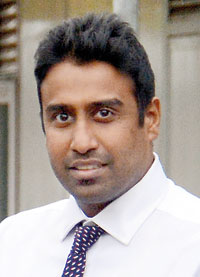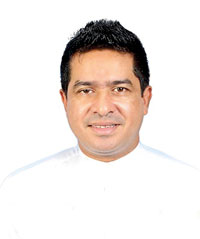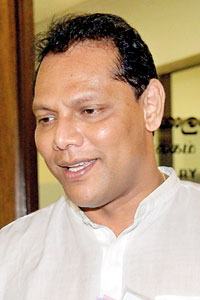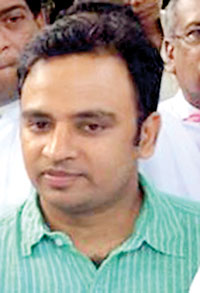Columns
How cells spelt out the names of top scorers in COPE’s bond game

ALOYSIUS: Busy on line
First a legal DISCLAIMER to alert the reading public that nothing in today’s SUNDAY PUNCH 1 is intended directly or indirectly, by innuendo or imagination howsoever farfetched to suggest or convey in any manner whatsoever or to create the impression in any wise or dumb mind that those named in the Presidential Bond Scam Commission proceedings on Thursday persons who had been in constant touch with Arjun Aloysius are guilty of any wrongdoing merely because they called and received calls on their private cell phones to and from the said Arjun Aloysius, the primary bond dealer at the centre of the Central Bank’s Rs 5 billion bond scam, who himself, as the law demands and natural justice dictates, is entitled to the presumption of innocence until proven guilty by a competent court of any illegality, if any, in the treasury bill affair.
 This Thursday the CID presented to the Presidential Bond Commission for its examination a list of the call records made by ministers and MPs of this government to Arjun Aloysius, some calls made whilst they were serving on the Committee of Public Enterprises which was then inquiring into to the 5 billion buck bond scam. Despite objection from defense counsel representing Aloysius, the Commission ruled the evidence admissible.
This Thursday the CID presented to the Presidential Bond Commission for its examination a list of the call records made by ministers and MPs of this government to Arjun Aloysius, some calls made whilst they were serving on the Committee of Public Enterprises which was then inquiring into to the 5 billion buck bond scam. Despite objection from defense counsel representing Aloysius, the Commission ruled the evidence admissible.
So what if there were calls made by Ministers and MPs who were members of the Committee on Public Enterprises to the whiz kid of treasury bonds Arjun at a privileged rate that enabled him to walk away with a cool 5 billion bucks killing stuffed in his backpack from the imposing edifice of the Central Bank where his father-in-law Arjuna held court as Governor on its fifth floor? Is it a crime to dial a friend’s number, an offense to receive a call from a friend even if he is accused of a wrongdoing? Is it the politically correct philosophy of this country today that friendship must be based on fair weather?

SENASINGHE: 227 calls
Of course, there is the popular notion, that one shall be judged by the company one keeps. Of course, in the Buddha’s Mangala Sutra there is that nagging stanza to avoid, even shun, the company of unsavoury characters but on a pragmatic level as a practicing politician in Lanka’s current pervasive political climate can one demand a character certificate from a person before wooing his vote and accepting it with thanks?
To put it another way, even as the Buddha exhorted his lay disciples in the Mangala Sutra to bask, instead, in the company of the wise, the learned, the morally and monetarily incorruptible, isn’t it far too much to expect a person who had taken to politics to earn a living, to emerge from an audience with the chief monk of the Malwatte Chapter adorned with a halo of a more enlightened being?
Given the amounts of visits Lanka’s politicians have had with the venerable monk, occasioned by every drop of their hats and the moments spent in such sagacious company, Lanka’s ministers and MPs would have been Arahants by now and the nation’s remaining lay would have been forced to request New Delhi to add politicians, too, to the list of carpenters, masons, doctors and labourers in the Indo-Lanka ECTA treaty soon to be signed to import from India a shipload of Jayalalithaas and Ramachandrands in the age old manner Chola scions were invited to become kings of Sihale Lanka.
The scorecard, according to the evidence presented by the Criminal Investigative Department before the Presidential Bond Commission read that the top bat who scored most for the UNP side was State Minister Sujeewa Senasinghe who totted a total number of 227 calls on his normal pay phone with 15 extras on the free Viber and Whatsapp lines with 63 of those calls made during the period he was a member of COPE probing the bond scam.

JAYASEKERA: 18 Calls
Perhaps all these logged calls to and fro from Aloysius to ministers and MPs of the Government were merely to wish one another a very good morning and to inquire after the weather and to express the hopes the rains will soon cease and the storms will soon blow away. One cannot judge a man and put him in the pillory and cast rotten tomatoes for having merely punched a number in all innocence and rule him guilty without first being privy to the contents of the conversation.
No doubt that was the reason that made Minister Senasinghe treat as being below his Kandyan dignity to answer former president Mahinda Rajapaksa’s son, MP Namal’ s question in Parliament on Thursday.
Namal’s question was: “Today, the CID has informed the bond commission that you made 44 telephone calls to Arjuna Aloysius while you were participating in the COPE investigation into the bond scam. What have you to say?
State Minister Senasinghe answer to that was to furnish no reply but to meet question with question and ask the ex president’s son: “Everybody knows your track record. How did you get through the law exams? Could you tell me at least what the first section of the Civil Procedure Code Ordinance is about? I challenge you to tell the House if possible and prove you know it. What is the first section of the Civil Procedure Code Ordinance about?
Namal was to repeat his question: “You are calling others cheats. How and why did you get 44 calls from Arjun Aloysius? Tell the House if possible.
Senasinghe was to repeat his retort: I will rephrase my question. I will make it easier. Tell the House of any section of the Civil Procedure Code?

RAJAKARUNA: 176 calls
To be fair to Namal, it did not seem a just question to challenge the validity of his right to claim attorney-at-law professional status, now was it? Namal may have scored 99 marks out of 100 as he is reputed to have earned at the Law College final exam but even if he had scored 100 out 100, failure to remember and answer off hand verbatim section 1 or any section for that matter in the Civil Procedure Code which contains over 830 sections with additional subsections, would not have negated his professional credentials howsoever gained.
It was like demanding a catholic, the Pope included, to quote by heart chapter and verse from every book of the Bible to prove his catholic faith and his right to practice his religion.
And when joint opposition MP D V Chanaka also raised the same question and asked the State Minister Senasinghe to reveal to the House the contents of the conversations he is alleged to have had with Perpetual Treasuries Limited owner Arjun Aloysius, the minister’s stock counter reply was to tell him: “Mallie, do not shout as I have appeared for your father and got him cleared when he was involved in a case involving some ships.”
The rest of the scorecard according to the CID scorer recorded that Aloysius had spoken a total 18 times with Dayasiri Jayasekera, 176 times with Harshana Rajakaruna and 73 times with Hector Appuhamy.
Unlike Senasinghe, Sports Captain Dayasiri Jayasekera did not opt to nudge the ball to the covers but stormed the pitch to hit the ball over silly mid off, saying he had not only had telephone conversations with Aloysius but had even invited him to his ministerial office where Aloysius had tried to “plead his innocence”. Minister Dayasiri added: “He said he was innocent. He asked me to help establish his innocence before the COPE. I declined to do so. I told him that the allegations against him were serious and that I could not help him.”
On Friday, JO MP Udaya Gammanpila urged the Sports Minister Dayasiri Jayasekera – who pole vaulted from the UNP to the Mahinda’s SLFP when Rajapaksa was in power seemed invincible and did a reverse somersault to Maithri’s SLFP when Sirisena won – to clear his name by seeking Speaker Karu Jayasuriya intervention to initiate a probe. Gammanpila’s assertion was that in accordance with the parliamentary Powers and Privileges Act No 2 of 1953, the Supreme Court could be moved against Perpetual Treasuries owner Arjun Aloysius or anyone else accused of exerting pressure on a parliamentary committee and if found guilty, he or she could face a jail term up to two years.

APPUHAMY: 73 calls
Minister Jayasekera’s immediate reported response was to say: “Ask my COPE colleagues whether I have said a word in support of Treasury bond racketeers.” Alas, the public have no direct access to his COPE colleagues and inquire from them what the minister said or did not say to them. What a pity, Minister Jayasekera had to wait for so long till the storm blew in his face to reveal his one to one, face to face, behind closed door meeting with primary bond dealer Aloysius at a time when the 6 billion buck bond dealer was the subject of a COPE inquiry of which committee Minister Jayasekera was a member. How more persuading would have been his belated explanation had he taken the public to his confidence and revealed to the nation then, Aloysius’s alleged solicitation of backroom favours from a Government Minister?
Why Harshana Rajakaruna talked 176 times on his cell phone with Aloysius, why Hector Appuhamy talked 73 times on his cell phone with Aloysius is still not known. Perhaps it was about the weather. And how best to take cover from the storm brewing in the distance.
| After hopper supper, Maithri’s bold bid to make the Rajapaksas come a cropper FLASHBACK TO FLASHPOINT: FROM CHINTHANAYA TO YAHAPALANAYA Three years ago this week, Maithripala Sirisena fled the ramparts of the Rajapaksa Temple Tree citadel to furtively emerge the following day at the New Town Hall to announce his decision to play David to Mahinda’s Goliath.  SIRISENA: Just governance philosophy Only three days earlier, on November 18th 2014, he had attended President Rajapaksa’s 69th birthday celebrations and had been entrusted with the task and honoured with utmost trust to bear, like the Maligawe tusker Raja, sacred relics of Arahants and to place the casket before the congregation of monks invited to chant pirith and invoke the blessings of the Triple Gem and the Gods upon the birthday boy who had announced three weeks earlier on November 2nd, his intention to seek a fresh third mandate from the people. He had proclaimed the date: January 8th 2015, nearly two years before his allotted presidential term ran out. He had surveyed the course: found it wanting a worthy foe to match his steel and spur, his temper and fire; and knew it would be a one horse race once again, with him in the winning enclosure. The only challenge seemed to be that favourite loser wearing green astride his loyal ass; and, though some rich backers had placed their bets on the jockey, with the same whimsical belief the pragmatic servant Sancho Pancha had placed upon and followed his master Don Quixote as he challenged windmills on his bony old knackered horse Rosinante, Mahinda knew donkeys do not win the Derby. But Mahinda hadn’t bargained for the dark horse that had been born, bred and groomed in his own stables, silently but impatiently stomping its hooves, waiting for the trap door to spring open to break free and make a dash to the finishing post and there reveal the corrupt dirt in the Rajapaksa Medamulana barn that had piled for over ten long years; and would tax the labours of Hercules to give it a thorough new spring cleaning with a new Yahapalana designer broom. And present the sprightly stable to the nation as a charwoman’s job transparently well done. Of course, Mahinda had not ordered the starter’s whistle to blow two years before its scheduled time for a spiffing takeoff based on his belief that there’s providence in the fall of a sparrow or in the rise of a president. Though much blame had been heaped upon soothsayer Sumanadasa’s sense of starry ill-timing and much scorn had been piled upon the art of astrological predictions, the former president astutely knew that his fate lay not in the stars, not even in himself, but found its natural province, thousands of miles away in Geneva’s UNHRC office. He sniffed the cold wind set to blow from those alpine peaks and sensed the avalanche poised to descend upon the people of Lanka and knew how the snow fallout would engulf his hopes of dynastic ambitions and bury in its aftermath perpetual Rajapaksa rule.  RAJAPAKSA: One man’s philosophy show For his refusal to honour his promise to the then UN Secretary General Ban Ki-moon to work towards reconciliation with the minority communities and his steadfast refusal to subject himself and others to a United Nation’s War Crimes probe; for his reluctance to implement his own Truth and Reconciliation Committees’ recommendations to heal the wounds of war, his political antenna may have twittered warnings that the country faced a US, a European, an Indian embargo on all imports to and exports from Lanka, including oil. That not even Godfather China would be able to help him and Lanka with their UN Security Council veto to place a total UN ban. And that he desperately needed an indispensable fresh mandate from the masses to reinforce his legitimacy of representing the people’s will before March 2015 UN deadline. And show the world that though the Unlisted States Government had publicly called for a regime change and his ouster, the sovereign people of Lanka had endorsed him to further rule and not condemned him as stale bread well past his five year shelf life. It was January or never. And as he pedaled his push cycle last Thursday to Parliament to demonstrate his protest at the petrol shortage caused by the rejection of one oil shipment and the public’s furious outburst of anger against the government for one miserable week of inconvenience, perhaps he congratulated himself for his foresight and for the wisdom of his judgment to call for an early election. Forewarned as he surely would have been by his topmost officials to the grim reality of what the western world and big bro India had in store for the people and for him – due to his intransigent refusal to bend the knee in fear of a chauvinistic backlash – he may, perhaps, have contemplated as he pedaled his cycle a few yards to Parliament last Thursday, how two years of shortages – of food, fuel, medicine and other essentials brought about by a world embargo – would have condemned the entire nation to use pedal power on an empty stomach; and how it would have wrecked any hope he may have had of winning an election in such a bleak climate. If January 2015 was a calculated gamble, then November 2016 would have been a case of suicide confirmed. For Maithripala Sirisena, however, it was no calculated risk but more a lethal game of Russian roulette: not one bullet in a barrel of six but five in the pistol with only one chamber empty. And with his rival’s finger on the trigger. And on that momentous day of 21st November when Sirisena arrived at New Town Hall to take his place on the dais and declare his departure from the Rajapaksa encampment to face an uncertain future, he, perhaps, may have felt he was striding up the scaffolding’s steps where the gallows were awaiting his arrival to hang him high till the last breath had expired from his body if he were to lose his life and death wager. The night before he had dined at Temple Trees at the invitation of its incumbent and together with the host had continued with poker face to break hoppers knowing full well in his heart that he would turncoat at high noon in the coming day. But Temple Trees was no Garden of Gethsemane and Mahinda was no Messiah even as Maithri was no Judas. And the price was not thirty silvers either. It was at the cost of his life, with his neck on the line. Not only his but the necks of his entire family. On the positive side, he somehow or other managed to repeal Rajapaksa’s 18th amendment and replace it with his 19th amendment against all odds in a Parliament still dominated by a Rajapaksa majority. Last year he introduced the Right of Information Act. He has started the process of bringing in a new constitution, a draft of which was presented to Parliament for discussion last month. On the negative side, the economic boom promised is still to materialize. The crackdown on those mega corrupt politicos is proceeding at snail’s pace. Corruption still exists even in the present coalition ranks. But perhaps his greatest feat is to have introduced the word Yahapalanaya to Lanka’ lexicon. But ever since its advent, it has been the subject of mockery by those amongst us who remain ignorant of its ideals and meaning. While they clamour for democracy they debunk Yahapalanaya without realising that both are one and the same. Merely because Maithri coined the Sinhala word, it does not give him exclusive trademark rights. Accountability, transparency, the guarantee of human rights, Under the Rajapaksa regime it was its leader’s chinthanaya, philosophy that was hailed to be the political philosophy of the nation. Under the present regime, Yahapalanaya, just governance, the political philosophy of all democratic nations, that is hailed as the political philosophy of Lanka too. Therein lies the difference between dictatorship and democracy. What many still do not seem to fathom is Yahapalana is not Maithri’s gift to Lanka’s mankind. It embodies the ideals of democracy born of Greece, which others paid with their lives and shed with blood to gain Paine’s Rights of Man and to preserve and protect and make it a sacrosanct way of life. As the Buddha said all evil is born out of ignorance and as Jesus said on the cross, “father forgive them, for they do not understand’ is what leads many of Lanka’s masses to mock, scorn and pile ridicule upon it. It is the gross failure to realise its not some washing machine bought on hire purchase with a five year warranty card to cleanse the transgressions of society, but one which each and every Lankan is responsible to wean and worm and nurture for life to see its proper growth until it becomes part and parcel of the nation’s life. As it has been said ‘eternal vigilance is the price of liberty’. Corruption will always be there in some form or another under any government here in Lanka or anywhere else abroad. That is not the yardstick to measure a government’s performance. The yardstick is how the government reacts to instances of corruption. If it was otherwise, and the people suffered the belief that a Maithripala promised Yahapalanaya was a magic wand and could be waved and, hey presto, banish corruption to the netherworld, we might as well throw the Bribery Act to the fire and shut down the Bribery Commission. It’s not the existence of corruption but a government’s response to it. A society’s strength stems from its willingness to recognize corruption’s existence and take steps to mend the error of its way. One mega example of corruption happened early. In the first watch of the Yahapalanaya dawn, The Central Bank Bond February bond issue turned scandalous when it became known that a major block of treasury bills had been given to the son in law of the governor of the bank. Early this year the president appointed a Commission of inquiry to probe the scandal Even before the commission has concluded its sittings and forwarded its report, its proceedings alone has led to the resignation of the former finance minister. Tomorrow morning the prime minister of the country is to appear before it to give evidence and be the role he played in it. | |


Leave a Reply
Post Comment